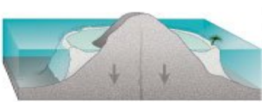Coral reef
Coral Reef[edit]

A coral reef is a diverse underwater ecosystem held together by calcium carbonate structures secreted by corals. Coral reefs are built by colonies of tiny animals found in marine waters that contain few nutrients. Most coral reefs are built from stony corals, which in turn consist of polyps that cluster in groups. The polyps belong to a group of animals known as Cnidaria, which also includes sea anemones and jellyfish. Unlike sea anemones, corals secrete hard carbonate exoskeletons that support and protect the coral polyps.
Formation[edit]
Coral reefs form in tropical oceans where the water is clear, shallow, and warm. The process of reef formation begins with the settlement of coral larvae on a hard substrate. Over time, these larvae grow into coral polyps and form colonies. As the colonies grow, they secrete calcium carbonate, which builds up the reef structure.
Types of Coral Reefs[edit]
There are three main types of coral reefs: fringing reefs, barrier reefs, and atolls.

Fringing Reefs[edit]

Fringing reefs are the most common type of reef. They grow directly from a shoreline and are separated from the shore by narrow, shallow lagoons. These reefs are found in the early stages of reef development and are often seen along the coastlines of islands and continents.
Barrier Reefs[edit]

Barrier reefs are similar to fringing reefs but are separated from the shore by deeper, wider lagoons. The Great Barrier Reef in Australia is the most famous example of a barrier reef. These reefs form as the land subsides or sea levels rise, creating a lagoon between the reef and the land.
Atolls[edit]

Atolls are ring-shaped reefs that encircle a lagoon. They form when an island surrounded by a fringing reef subsides completely below sea level, leaving the reef as a ring. Atolls are often found in the Pacific and Indian Oceans.

Ecological Importance[edit]
Coral reefs are often referred to as the "rainforests of the sea" because of their rich biodiversity. They provide habitat and shelter for many marine organisms, including fish, mollusks, and crustaceans. Reefs also protect coastlines from erosion and contribute to the formation of sandy beaches.
Threats to Coral Reefs[edit]
Coral reefs face numerous threats, both natural and anthropogenic. Climate change, leading to ocean warming and acidification, poses a significant threat to coral reefs. Other threats include overfishing, destructive fishing practices, pollution, and coastal development.
Conservation Efforts[edit]
Efforts to conserve coral reefs include the establishment of marine protected areas, restoration projects, and policies aimed at reducing carbon emissions and pollution. Public awareness and education are also crucial in promoting the conservation of these vital ecosystems.
Related Pages[edit]
Ad. Transform your life with W8MD's Budget GLP-1 injections from $75


W8MD offers a medical weight loss program to lose weight in Philadelphia. Our physician-supervised medical weight loss provides:
- Weight loss injections in NYC (generic and brand names):
- Zepbound / Mounjaro, Wegovy / Ozempic, Saxenda
- Most insurances accepted or discounted self-pay rates. We will obtain insurance prior authorizations if needed.
- Generic GLP1 weight loss injections from $75 for the starting dose.
- Also offer prescription weight loss medications including Phentermine, Qsymia, Diethylpropion, Contrave etc.
NYC weight loss doctor appointmentsNYC weight loss doctor appointments
Start your NYC weight loss journey today at our NYC medical weight loss and Philadelphia medical weight loss clinics.
- Call 718-946-5500 to lose weight in NYC or for medical weight loss in Philadelphia 215-676-2334.
- Tags:NYC medical weight loss, Philadelphia lose weight Zepbound NYC, Budget GLP1 weight loss injections, Wegovy Philadelphia, Wegovy NYC, Philadelphia medical weight loss, Brookly weight loss and Wegovy NYC
|
WikiMD's Wellness Encyclopedia |
| Let Food Be Thy Medicine Medicine Thy Food - Hippocrates |
Medical Disclaimer: WikiMD is not a substitute for professional medical advice. The information on WikiMD is provided as an information resource only, may be incorrect, outdated or misleading, and is not to be used or relied on for any diagnostic or treatment purposes. Please consult your health care provider before making any healthcare decisions or for guidance about a specific medical condition. WikiMD expressly disclaims responsibility, and shall have no liability, for any damages, loss, injury, or liability whatsoever suffered as a result of your reliance on the information contained in this site. By visiting this site you agree to the foregoing terms and conditions, which may from time to time be changed or supplemented by WikiMD. If you do not agree to the foregoing terms and conditions, you should not enter or use this site. See full disclaimer.
Credits:Most images are courtesy of Wikimedia commons, and templates, categories Wikipedia, licensed under CC BY SA or similar.
Translate this page: - East Asian
中文,
日本,
한국어,
South Asian
हिन्दी,
தமிழ்,
తెలుగు,
Urdu,
ಕನ್ನಡ,
Southeast Asian
Indonesian,
Vietnamese,
Thai,
မြန်မာဘာသာ,
বাংলা
European
español,
Deutsch,
français,
Greek,
português do Brasil,
polski,
română,
русский,
Nederlands,
norsk,
svenska,
suomi,
Italian
Middle Eastern & African
عربى,
Turkish,
Persian,
Hebrew,
Afrikaans,
isiZulu,
Kiswahili,
Other
Bulgarian,
Hungarian,
Czech,
Swedish,
മലയാളം,
मराठी,
ਪੰਜਾਬੀ,
ગુજરાતી,
Portuguese,
Ukrainian